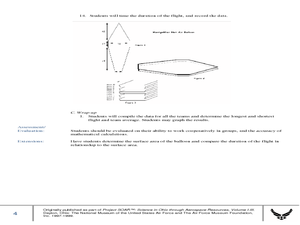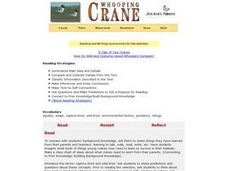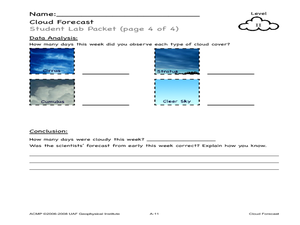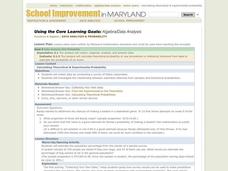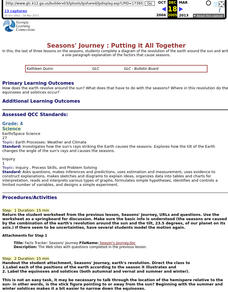Curated OER
Hydrologic Cycle Scavenger Hunt
Students explore the water cycle using educational resources. In this water cycle lesson, students use a global climate DVD to complete a scavenger hunt on the hydrologic (water) cycle.
Curated OER
Water Cycle Bag
Students enclose water in an airtight bag and leave it in a warm area to view the water cycle. In this water cycle lesson plan, students observe evaporation, condensation, and precipitation. They then discuss what they learned about the...
Curated OER
Convection and Wind
Students use water, beakers, hot plates, paper dots, and goggles to participate in a hands on activity where they see how a convection current creates wind. In this convection current lesson plan, students participate in a hands on...
Curated OER
Climate Change
Students compare weather data and draw conclusions. For this climate change lesson plan, students determine whether data collected over a period of ninety years shows a warming trend.
Curated OER
Soil Permeability
Young scholars discuss how soil permeability is affected by permafrost. In this soil lesson plan, students freeze soil over night, and discuss how the environmental conditions of freezing affect soil and further affect vegetation.
Curated OER
Extreme Weather
Students examine different types of extreme weather and how to prepare for them. In this weather instructional activity students explore different types of extreme weather and create disaster preparation posters for different types...
Curated OER
Fred the Fish -- A River Ran Wild
Students apply cause and effect relationships to water pollution in a stream. In this pollution lesson students recognize the importance of clean water in their daily lives. Students accompany "Fred the Fish" as he travels down stream....
Curated OER
Growth of a River
Students evaluate geography by drawing an image in class. In this river lesson, students identify a list of vocabulary terms associated with bodies of water. Students identify how a river is formed and draw a picture of one including the...
Curated OER
Gray Whales: Hitchhikers: Free Rides on Gray Whales
Students read about Gray Whales and circle any unfamiliar terms.
Curated OER
Meet the Eastern Flock: Hatch Year 2002
Pupils read nonfiction books and magazine articles about whooping cranes.
Curated OER
Up, Up and Away with the Montgolfier Balloon
Students construct hot air balloons. In this science lesson plan, students assemble their own balloon using tissue paper and glue. They time the duration of the flight, record data and calculate team averages.
Curated OER
Insect Classification
Young scholars compare and contrast the visible structures of three insects based on photographs. They differentiate characteristics of crane flies, ants, and wasps then create a simple classification system.
Curated OER
A Tale of Two Cranes How Do Wild and Costume-raised Whoopers Compare?
Students explore what young cranes need to do to survive.
Curated OER
Probability: Playing with Fire
Students use probability to determine how likely it is for each tree in a small forest to catch on fire.
Curated OER
High Exposure
Students interpret data they receive from the media, discuss possible misinterpretation of data from the media and correctly respond to the misconception quiz question.
Curated OER
The Underground Railroad and the I & M Canal in Illinois
Young scholars, in groups, discuss the Underground Railroad, then fill out a worksheet.
Curated OER
Cloud Forecast
Students record weather observations and research online weather data. In this weather observations lesson, students study the cloud cover for several days and record their observations in a chart. Students identify the cloud types and...
Curated OER
Ecology: Adaptations
Eighth graders identify different types of adaptation in organisms. In this biology lesson, 8th graders explain how adaptation help organisms survive. They complete a worksheet at the end of the lesson.
Curated OER
Comparing Amount of Rainfall in Different Geographical Areas
Students construct rain gauges and use them to log rainfall in their school zone, local city, and region and then compare and discuss them by plotting this information.
Curated OER
Calculating Theoretical & Experimental Probability
Students explore the concept of experimental and theoretical probability. In this experimental and theoretical probability lesson, students collect data by conducting a survey of their classmates. Students compare their data and discuss...
Curated OER
Seasons' Journey : Putting it All Together
Third graders complete a diagram of the revolution of the earth around the sun and write a one paragraph explanation of the factors that cause seasons.
Curated OER
Seasons' Journey: As the World Turns
Fourth graders explore the earth's revolution around the sun and the changes in weather that follow this motion.
Curated OER
Don't Throw Away That Junk Mail!
Fourth graders study junk mail to learn the techniques that advertisers use to attract and hold a person's attention.












